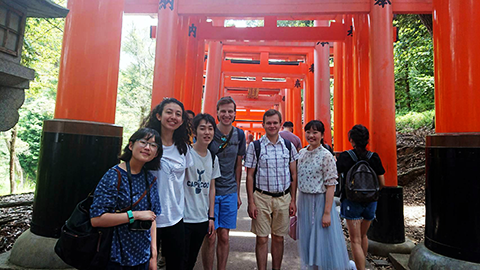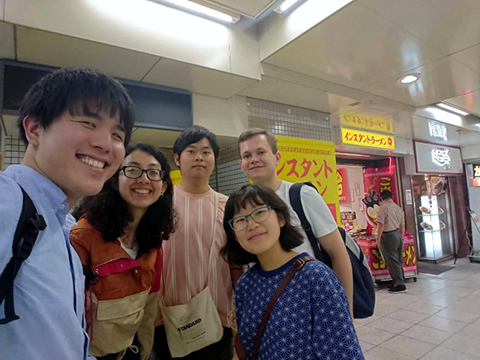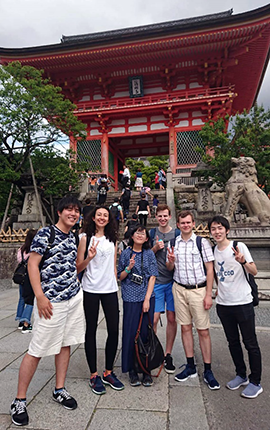国際・国内交流
Rebecca Wuさん(ワシントン大学医学部 第4学年次)
Clinical Exchange Program at Hyogo College of Medicine
I have always been interested in Japanese culture and have visited the country a few times previously for tourism and sightseeing, but I had never had any prior experience working at a hospital in another country. When I heard about the opportunity to participate in a medical student exchange program at Hyogo College of Medicine (HCOM) as a clinical elective through my medical school, I was excited to attend and honored to be selected for the program. My main goal in participating in the program was to learn more about the health care system in Japan. I also wanted to discover some of the sociocultural and environmental factors that contribute to Japan having one of the longest life expectancies in the world.
I spent my first week with the Gastroenterology Department, where most of the day was spent observing procedures such as routine screening EGD, colonoscopy, biopsies, and resections. It was interesting to compare the different epidemiology and burden of disease between the US and Japan and how it affects standards of practice. For example, the prevalence of gastric cancer is much higher in Japan compared to the US, likely due to the increased burden of H. pylori infection in East Asia. In comparison, we do not routinely screen for gastric cancer in the US due to its low incidence, and it is uncommon for providers to be trained in performing endoscopic mucosal dissection for removal of gastric tumors. It was captivating to see the Japanese doctors skillfully performing this meticulous procedure.
My second week was spent with the Pediatrics Department, and I was looking forward to observing how Pediatric medicine is practiced in another culture. Again, I was able to identify differences between the US and Japan in the prevalence and treatment of some conditions. For instance, asthma exacerbation is a common reason for pediatric Emergency Department visits and hospital admissions in the US; however I found that it was very uncommon in Japan. While the prevalence of severe asthma appears to be similar between the two countries, the rate of death and disease burden due to asthma is lower in Japan. This is most likely due in part to a robust universal public insurance program which allows for more equitable access to healthcare. Every insured Japanese citizen is covered for at least 70% of their medical costs, and the government regulates fees. The Japanese doctors I talked with were often shocked by how expensive medical care is in the US, the high rates of medical debt even amongst the insured, and by the great disparities in medical care between insured and uninsured patients.
Of course, there are also shortcomings of the universal health insurance system. As the population ages, more and more elderly Japanese will require expensive health care, which will place a large cost burden on the insurance system. For students interested in health policy, there is nothing better than being able to experience firsthand how medicine is practiced on a day-to-day basis in other settings.
I was also surprised to find that Japanese medical care is just as technologically advanced as other developed western countries. Patients have access to many of the same technologies and novel therapies, despite overall health spending being half that of the US. I spent a day in the Allergy Department where I learned about allergen desensitization trials that are conducted under inpatient observation. I was amazed by how meticulously they would advance the exposure to food allergens gradually, sometimes by milliliters or millimeters at a time! Because of the cheaper cost of medical admission, they were able to easily admit patients for such trials in a safe and methodical manner.
Outside of my time in the hospital, I enjoyed the opportunity to travel around the Kansai region during the evenings and weekends. The location of HCOM is convenient to reach many great locations in Japan such as Osaka, Kobe, and Kyoto. The Japanese medical students were so hospitable and eager to guide me and help me plan trips whenever they had the time. Some members of the English Club took all the exchange students on a guided one-day tour of Kyoto, and we were able to visit some of the most famous sites in Kyoto such as Kiyomizu-dera and the Fushimi Inari-jinja. We enjoyed many different delicious local specialties together such as okonomiyaki, takoyaki, sushi, and matcha desserts. Being able to sightsee with the other exchange students and the English Club students was so much fun, and I learned a lot about the Japanese culture and language.
During my trip, I was looking forward to visiting Kobe because it is Seattle’s sister city. I noticed many similarities between the two cities, for example both cities have beautiful natural landscapes and are surrounded by the ocean on one side and mountains on the other. They are port towns that have a history of trade with other countries, creating a vibrant multicultural environment. In Kobe this is exemplified by the Kobe Chinatown and Kitano-cho district, where there are many exhibits in the former residences of foreign merchants and diplomats. I also enjoyed taking a day trip to Mount Rokko which had a beautiful botanical garden, wonderful view, and a fun ropeway ride to Arima Onsen where I was able to decompress by enjoying historic public baths.
This medical exchange opportunity helped me to further develop my skills as a future pediatrician, as well as to obtain cross cultural experiences that I hope I can implement in my future practice. The impacts of this program have far exceeded just the duration of the program, as I will be able to meet with some of the students exchanging from HCOM to the University of Washington for a future summer program. It is wonderful that this program has allowed me to maintain connections with other medical professionals from around the world. The Japanese doctors were all very supportive and helpful in translating patient encounters and charts into English so that I could understand their treatment ideas, and the students were very welcoming hosts for my stay in Japan and made sure I got to experience their home country. It was an unforgettable experience, especially for someone who had never studied abroad before. My only regret is not being able to stay longer in Japan!


